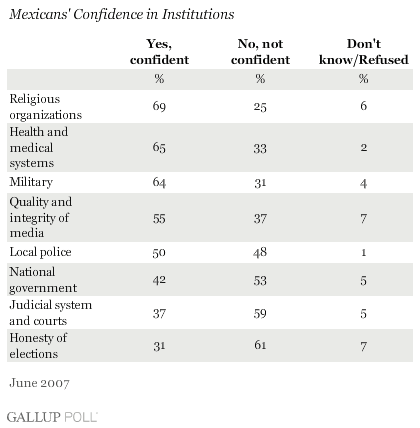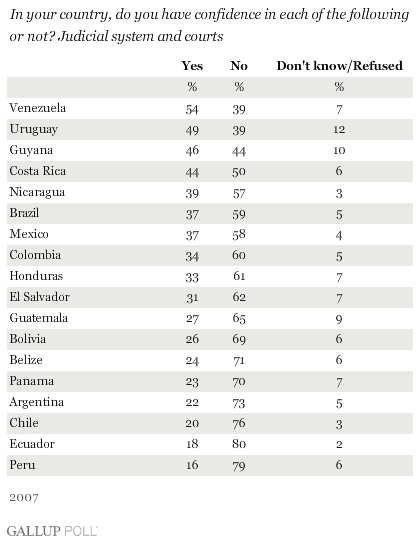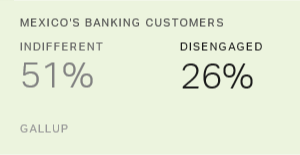WASHINGTON, D.C. -- As Mexico's Congress wrangles to reach a verdict on overhauling its justice system, a Gallup Poll reveals that the Mexican people would likely find in favor of a system that's better than the one they currently have.

Barely more than a third (37%) of the Mexican public Gallup surveyed in June 2007 expressed confidence in the country's judicial system and courts; among the institutions asked about, only the honesty of the country's elections elicited less confidence. Some experts believe Mexico's current slow, closed-door "paper" trial system undercuts Mexicans' confidence, and oral public trials that are part of the judicial reform may increase perceived transparency and speed. Unlike trials in the United States and several other Latin American countries, there is no live argument in most Mexican courtrooms -- trials are conducted and decided entirely based on an exchange of written briefs with the judge.
At the end of last year, lawmakers appeared poised to pass long-awaited justice reform that would guarantee the right to oral public trials, the presumption of innocence, and greater accountability. But endorsement faltered over fears that the additional measures Mexican President Felipe Calderón has championed in his fight against organized crime, including those that enable police to enter homes without warrants, would make citizens vulnerable to rights violations. According to a report Tuesday in the Mexican paper Excelsior, the Party of the Democratic Revolution (PRD) announced that it planned to block the reform, which could be adopted this week, because of these concerns.
A Common Concern
Residents across Central and South America appear to hand down similar indictments of their judicial systems. Majorities in 14 of the 18 countries Gallup surveyed say they do not have confidence in their judicial systems, but the 37% of Mexicans who express confidence in the judiciary is somewhat better than the regional median of 32%. Since the mid-1990s, Chile, Peru, Colombia, Argentina, Guatemala, and Venezuela have instituted various types of judicial or penal reform.

While many Mexican lawmakers agree on the proposed revisions to the criminal trial system, a key issue in this debate has been the new powers granted to police. The president of Mexico's lower house told Mexican media last week that even with the Senate's amendments that restricted searching homes without warrants to cases in which a person's life is in danger, the current reform proposal risks violating citizens' rights, and it is not likely to pass this session. Other lawmakers, however, are more optimistic that they can make a deal soon that secures citizens' rights and aids Mexico's fight against organized crime and drug cartels.
Survey Methods
Results are based on face-to-face interviews conducted in 2007 with randomly selected national samples of approximately 1,000 adults, aged 15 and older, who live permanently in the 18 Central and South American countries polled. For results based on these samples, one can say with 95% confidence that the maximum margin of error attributable to sampling and other random effects is ±3 percentage points. In addition to sampling error, question wording and practical difficulties in conducting surveys can introduce error or bias into the findings of public opinion polls.
